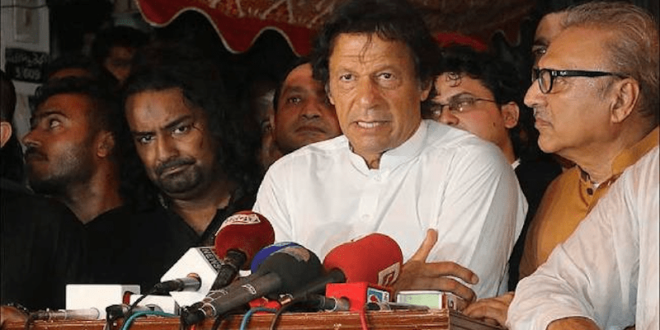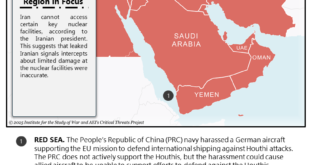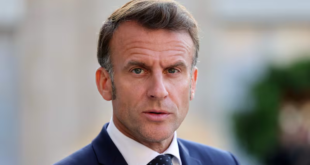In an article in the respected British journal, The Economist Pakistan’s ousted Prime Minister Imran Khan has expressed doubt about the fairness of the forthcoming General Elections scheduled to be held in January 2024. In his words, Imran Khan is now in jail on charges of exposing state secrets by reading out in the Pakistan National Assembly a secret telegram sent by the Pakistani ambassador to Washington which accused the US government of conspiring with the Pakistani military authority to oust Imran Khan from his post as Prime Minister.
The allegation was naturally dismissed by the US government. Imran Khan wrote “Whether elections happen or not, how I and my party have been targeted since a farcical vote of no confidence in April 2022 has made one thing clear: the establishment—the army, security agencies, and the civil bureaucracy—is not prepared to provide any playing field at all, let alone a level one, for PTI. It was, after all, the establishment that engineered our removal from government under pressure from America, which was becoming agitated with my push for an independent foreign policy and my refusal to provide bases for its armed forces”.
Imran Khan, added “Because of what the cipher message said, I believe that the American official’s message was to the effect of pulling the plug on Imran Khan’s Prime Ministership through a vote of no confidence, or else. Within weeks our government was toppled and I discovered that Pakistan’s Chief of Army Staff, General Qamar Javed Bajwa, had, through the security agencies, been working on our allies and parliamentary backbenchers for several months to move against us… There were two assassination attempts on my life. My party’s leaders, workers, and social media activists, along with supportive journalists, were abducted, incarcerated, tortured, and pressured to leave PTI. Many of them remain locked up, with new charges being thrown at them every time the courts give them bail or set them free. Worse, the current government has gone out of its way to terrorize and intimidate PTI’s female leaders and workers to discourage women from participating in politics…
I remain incarcerated, in solitary confinement, on absurd charges that include treason. Those few of our party’s leaders who remain free and not underground are not allowed to hold even local worker conventions. When PTI workers manage to gather together they face brutal police action. In this scenario, even if elections were held they would be a disaster and a farce since PTI is being denied its basic right to campaign. Such a joke of an election would only lead to further political instability….Despite all this, PTI remains popular, with 66% support in a Pattan-Coalition 38 poll held in December; my personal approval rating is even higher. Now the election commission, desperate to deny the party the right to contest elections, is indulging in all manner of unlawful tricks. The courts seem to be losing credibility daily.
Meanwhile, a former prime minister with a corruption conviction, Nawaz Sharif, has returned from Britain, where he was living as an absconder of Pakistani justice. In November a Pakistani court overturned the conviction. I believe that Sharif has struck a deal with the establishment whereby it will support his acquittal and throw its weight behind him in the upcoming elections” Imran Khan adds that I remain incarcerated, in solitary confinement, on absurd charges that include treason. Those few of our party’s leaders who remain free and not underground are not allowed to hold even local worker conventions. When PTI workers manage to gather together they face brutal police action. In this scenario, even if elections were held they would be a disaster and a farce since PTI is being denied its basic right to campaign. Such a joke of an election would only lead to further political instability.” If convicted Imran Khan faces a jail sentence of fourteen years.
Since Major General Iskander Mirza became President of Pakistan the army either directly or indirectly has been ruling the country. A Pakistani analyst wrote in October 2021 before the ouster of Imran Khan from the post of Prime Minister was the blue-eyed boy of the Pakistani army. Once again, in a repetition of the same pattern that has dogged Pakistani politics since the country’s inception, the military and civilian government have become embroiled in a tense and highly publicized tussle for power. Imran Khan—who became Prime Minister in an election allegedly rigged in his favor by the army—had refused to sign off on the appointment of Lt. Gen. Nadeem Anjum as the country’s top spymaster.
As a result, Islamabad has become the setting of a constitutional crisis that has enervated the state and left crucial military departments without leadership and direction. At the center of this conflict is Faiz Hameed the outgoing current director general of Inter-Services Intelligence (ISI), who has been blamed in various quarters for rigging the 2018 election. From General Ayub Khan’s ten years of so-called prosperity during which the country was completely under the control of the army to General Yahya Khan’s ignominious defeat at the hands of Lt. Gen Jagjit Singh Arora was a period of shame for the Pakistan Army. After campaigning on autonomy for East Pakistan, Sheikh Mujibur Rahman’s Awami League won almost every seat in the National Assembly that had been allotted to the east wing of then Pakistan. Logically he now was the paramount leader in East Pakistan, and, because his party had won a majority of the 300 contested seats in the National Assembly, Bangabandhu Shiekh Mujib was entitled to form the national government.
However, Bhutto—whose Pakistan Peoples Party had won a commanding majority in West Pakistan—and the military establishment refused a government where the country’s future might be unilaterally decided by the East. Arguing that Mujib did not have a single seat in the western provinces and that he, Bhutto, was the only serious representative from the west wing, Bhutto insisted on using another formula to organize the civilian government. Bangabandhu Sheikh Mujib having been elected on the promise of pursuing autonomy in East Pakistan, was unwilling to compromise on his six-point program for the East to enjoy increased self-governance. Bhutto and his associates, meanwhile, saw the program as an end to federation altogether. Bhutto convinced Yahya Khan to postpone the convening of the National Assembly as the two sides worked to find a solution, and Yahya Khan did so on March 1, 1971. Bangabandhu Sheikh Mujib declared that the people of Bengal had once again been betrayed by the power in West Pakistan. In the dead of night, the Pakistan Army launched one of the worst genocides in the history of the world on unarmed and unaware Bengalis which finally led to the birth of Bangladesh as an independent country.
Unfortunately, the US sided with Pakistan in the debate in the UN Security Council and noted that its alliances with Pakistan did not commit Americans to take sides in a civil war, even one internationalized by the Indian “invasion” of East Pakistan. It was clear that India had effectively and irreversibly dismembered Pakistan and that the Muslim country would now take a different form from the one created by Mohammed Ali Jinnah and the Muslim League. Zulfiqar Ali Bhutto the leading politician in what remained of Pakistan, assumed the presidency.
Bhutto was placed under house arrest, and, on July 5, 1977, Gen. Mohammed Zia ul Huq, Bhutto’s personal choice to head the Pakistan army, took the reins of government. Bhutto’s subsequent arrest on charges that he ordered the assassination of a political rival, and Zia’s insistence that he be tried for this alleged crime, brought an end to the Bhutto era and ushered in the Zia ul-Haq regime. Found guilty and sentenced to death, Bhutto was hanged on April 4, 1979. His regime ended on August 17, 1988, when he was killed when his aircraft blew up in mid-air. The cause of the crash, which also took the life of the U.S. ambassador to Pakistan and several top-ranking Pakistani generals, has never been fully determined. He was succeeded by Zulfiqar Ali Bhutto’s daughter Benazir Bhutto. She had another stint as Prime Minister.
National elections were held again in October 1993. In a close contest, the PPP won a plurality—though not a majority—of seats in the National Assembly; Nawaz Sharif’s new Pakistan Muslim League (N) was a somewhat distant second. Benazir Bhutto’s assassination while campaigning for the third term ended her career. After the resignation of Parvez Asif Ali Zardari was elected President as neither the PML-N nor the PML-Q candidate won enough support to pose a challenge to Zardari, the PPP’s candidate.
The latest twist in Pakistani politics was the return of Nawaz Sharif whose earlier criminal offences were withdrawn by the court. In between was the killing of Osama Bin Laden the leader of the al-Qaeda network. The assault, carried out by a small team transported by helicopter, was launched after U.S. intelligence located bin Laden living in a walled compound in Abbottabad, a medium-sized city near Islamabad. Bin Laden’s presence in Abbottabad threatened to add new tension to the often-troubled security alliance between the United States and Pakistan. Pakistani officials had often denied claims that bin Laden was hiding out in Pakistan, possibly abetted by Islamic militants in the remote and rugged areas on the Afghan border. After bin Laden’s death, the news that he had lived in a large compound in an affluent area near the Pakistan Military Academy, one of the country’s most prestigious military institutes, raised questions about how his presence could have escaped the notice of Pakistan’s security forces. This in brief is the history of the army’s rule in Pakistan which does not appear to be curtailed in the foreseeable future. (For this part of the history of the Pakistani army and civilian relationship I am indebted to Encyclopedia. Britannica)
Sources say that Imran Khan was fearful of being voted out when the country scheduled to go to the polls in 2023, and he was adamant that Hameed should not be replaced, even though he has been posted to command a corps in Peshawar. According to an analyst, this was because Imran Khan did not believe he could win without the support of ISI, which was guaranteed for as long as Hameed remained in his post. In digging in his heels over this appointment, Imran Khan had placed himself in direct conflict with General Qamar Javed Bajwa, the long-presiding chief of Pakistan’s army, who authorized the replacement of Hameed with Anjum. An erstwhile ally of Imran Khan, Bajwa now has to suffer the ignominy of being defied by a Prime Minister whom he not only helped install but also protected at great cost to the army’s reputation.
The two main parties—the PPP and the PML-N—both held long-standing grudges with the establishment and could no longer be trusted to do its bidding. Both had been deposed in military coups; both had had their leaders persecuted by the state and, at various times in history, both had campaigned on anti-military platforms. It was in this environment that the army began to promote the candidacy of Imran Khan, with whom it believed it could cultivate a different sort of relationship. Political Scientist Maliha Lodi opined that it all speaks to the noisy nature of politics in Pakistan that there are competing power centers and even when it looks like the whole thing has been stitched up. Everything is being run from General Headquarters and there is more fluidity in the system.
 Eurasia Press & News
Eurasia Press & News



